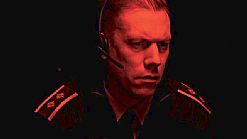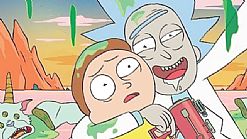Hard Ancient Life – polski teleport do starożytności /// Hard Ancient Life – the polish teleport to ancient times
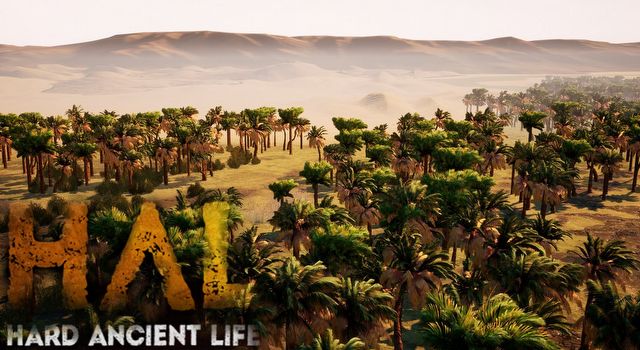
Spośród mnóstwa powstających niezależnych projektów, można wyłowić wiele ciekawych produkcji, które nie miałby szans na powstanie, gdyby ich los zależał wyłącznie od wielkich tuz branży gier. Tym grom rozpędu musi nadać pasja i poświęcenie ich twórców, działających często w zaciszu swoich domów, bez zaplecza profesjonalnego studia deweloperskiego. Jednym z tych tytułów jest tworzone praktycznie jednoosobowo Hard Ancient Life, historyczny city-builder, wzorowany na kultowych strategiach od studia Sierra, szczególnie zaś na Faraonie i dodatku do niego – Kleopatrze. Z autorem tej powstającej strategii Jackiem Turkiem udało się nam uciąć małą pogawędkę.
Among thousands of independent projects in development, there are many interesting productions that would never have the chance to be founded if their fate relied solely upon big companies of the computer game market. These titles must be driven by passion and devotion of their creators, who very often work at home without any support from professional developers’ studios. A good example of such game is a one-man creation – Hard Ancient Life. It’s a city builder inspired by famous strategies in productions from Sierra Company’s good old days, especially Pharaoh and its addon – Cleopatra. We had a chance for a small chat with its author Jacek Turek.
For english version of the interview click HERE or scroll down.
Zanim jednak przejdziemy do samej rozmowy wyjaśnijmy, jaki jest główny zamysł tego projektu. Otóż HAL ma być absolutnie oldschoolową strategią, w której przejmiemy rządy nad egipskimi miastami w okresie od Starego Państwa (czas gdy powstawały najsłynniejsze piramidy) do schyłku suwerenności Egiptu w czasach rzymskich. Główną atrakcją ma być kampania dla jednego gracza, mocno osadzona w ówczesnej rzeczywistości historycznej. Oprócz silnie zarysowanego aspektu planowania i rozbudowy metropolii, wraz ze wznoszeniem słynnych monumentów, będziemy musieli zająć się również spełnianiem potrzeb mieszkańców, wydobyciem surowców, handlem i dowodzeniem wojskami.
Medic: Hard Ancient Life to Faraon, tylko w nowej szacie graficznej. Prawda, czy fałsz?
Jacek Turek: Fałsz. Gra faktycznie jest inspirowana Faraonem, ale podobieństwa kończą się zasadniczo na podstawach mechanizmu rozgrywki - podobnie stawia się budynki, monumenty są obiektami wieloetapowymi, a na miasto od czasu do czasu nacierają wojska przeciwnika. Zasadniczo na tym koniec, ponieważ cała reszta według zupełnie innych założeń. Przede wszystkim budynki projektowane były w oparciu o rekonstrukcje albo modele grobowe chowane razem ze zmarłymi. Monumenty odtwarzane są tak, jak w rzeczywistości wyglądały - nie adaptujemy ich na potrzeby rozgrywki i nie montujemy ich z kilku opracowanych przez nas assetów. Mocno stawiamy na realizm historyczny, którego chcemy, żeby w grze było jak najwięcej.
To doprowadza nas do pytania o bardzo ważny aspekt w obu grach – religia. W Hard Ancient Life przedstawiamy społeczeństwo w stosunku do religii a nie religię w stosunku do społeczeństwa. Należy przez to rozumieć, że nie będzie fizycznie obecnych bogów np. Ozyrysa, który pozbawiony zainteresowania będzie nam demolował miasto. To ludzie będą domagać się obcowania z religią i nasza reakcja na te żądania będzie tym czynnikiem wpływającym na przebieg całej rozgrywki. Religia będzie jedną z wielu składowych złożonego modelu społeczeństwa, które to społeczeństwo okaże się faktycznie namacalne i możliwe do obserwacji.

Kolejnym aspektem, tym wręcz najważniejszym, jest cała warstwa ekonomiczna. Ten system ciągle ewoluuje, dodajemy wciąż nowe rzeczy i zmieniamy te już istniejące. Myślę, że tu proces dopinania wszystkiego na ostatni guzik zajmie najwięcej czasu ze wszystkich elementów gry. Przede wszystkim, zaczynając od skali mikro, pojawią się wszelkie problemy ze ściągalnością podatków oraz kwestie rzeczywistego wpływu ekonomii na funkcjonowanie poszczególnych klas społecznych. W Starożytnym Egipcie bardzo często zdarzało się, że chłop nie mając możliwości zapłaty podatku uciekał z miasta nawet porzucając rodzinę w obawie przed bardzo surowymi i brutalnymi poborcami podatkowymi. Gracz będzie miał zatem możliwość wyboru, w jaki sposób chce traktować swoich poddanych, co w dalszym ciągu będzie miało wpływ na ogólną wydajność gospodarki.
W grze naturalnie pojawi się handel, który również został poszerzony o przeróżne losowe czynniki wpływające na cenę towaru i jego podaż. Gracz zazwyczaj będzie musiał handlować by móc ukończyć dany poziom lub spełnić żądania Faraona i uniknąć najazdu wojsk rozwścieczonego władcy. W przeciągu całej kampanii gracz będzie mógł wyprodukować wszystkie dostępne w grze produkty (a jest ich trochę więcej niż w Faraonie), odpowiednio inne w każdej kolejnej misji przy zachowaniu bardzo podobnego łańcucha produkcyjnego. Sam proces produkcji będzie można oczywiście śledzić, gracz zobaczy więc, jak powstają zarówno te proste towary, jak na przykład cegły, jak i skomplikowane przedmioty, jak rydwany.
Zupełnie nowym elementem będzie możliwości wysyłania ekspedycji w poszukiwaniu złóż rzadkiego surowca. Będą to bardzo kosztowne wyprawy, które w przypadku swojego sukcesu zwrócą się po wielokroć, a w przypadku porażki przyniosą mnóstwo kłopotów - np. obniżą wskaźnik popularności gracza, a nawet sprowokują najazd sąsiedniego państwa, kiedy naruszy się jego strefę wpływów.
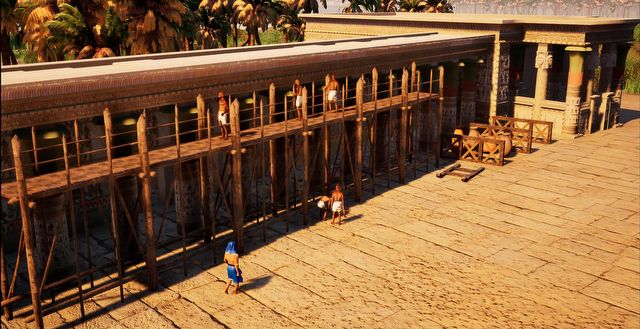
Medic: Bez wątpienia ogromnym atutem Faraona i dodatku Kleopatra była rozbudowana kampania, opowiadająca historię od czasów predynastycznych aż do ery Ptolemeuszy. Czy HAL również zaoferuje graczom możliwość wędrówki przez całość dziejów starożytnego Egiptu?
Jacek Turek: Główna kampania rozpocznie się w momencie zjednoczenia Egiptu a zakończy wraz z upadkiem rodu Ptolemeuszy. Zasadniczo jest to cała najważniejsza historia Starożytnego Egiptu opowiedziana pod postacią kolejnych misji do wykonania, zarówno tych pokojowych i ekonomicznych, jak również typowo militarnych.
Dodatkowo będzie druga kampania, która pojawi się już po wydaniu gry, będzie opowiadała o wszystkim, według dzisiejszego stany wiedzy, co działo się przed zjednoczeniem Egiptu w czasach predynastycznych. Gracz dowie się w niej skąd przywędrowali egipscy osadnicy, jak najprawdopodobniej doszło do tego, że Egipt w ogóle się zjednoczył, jak narodziła się jego skomplikowana religia i dlaczego jest tak niejednorodna. To będzie coś, czego zdaje się jeszcze nikt szerzej nie poruszał w grach komputerowych.
Medic: Faraon, podobnie jak inne pokrewne strategie od Sierry, miał świetną mechanikę budowy i zarządzania miastem, logistyki, ekonomii, handlu i budowania monumentów, jednak jego piętą achillesową był wybitnie toporny system dowodzenia wojskiem. Czy HAL zmieni coś w tej materii?
Jacek Turek: Faktycznie, Faraon był cudowną grą ale elementy militarne doprowadzały mnie do frustracji. Dodatkowo, według mnie, były też strasznie nudne i trochę wprowadzone na siłę. W przypadku HAL bitwy będą zdecydowane bardziej efektowne - będzie ich mniej, ale za to będą znacznie większe. Nie mogę jeszcze zdradzić wielu szczegółów, ponieważ cały militarny moduł dopiero powstaje, ale celujemy w wystarczającą na nasze skromne potrzeby namiastkę Total War.
Medic: Domyślam się, że HAL ma być konsekwentnie silny przede wszystkim swoją mechaniką, ale czy ma też w zanadrzu jakieś elementy, które będą szczególnie jasno świecić - powodować tzw. "opad szczęki"?
Jacek Turek: Grając w Faraona przez dużo czasu zasadniczo nic się nie klika - gracz buduje miasto i czeka, aż się rozwinie. Sam proces budowy jest czysto mechaniczną sprawą, musi być szybki, intuicyjny i sprawnie działać, tu nie ma co ulepszać. Natomiast ta dłuższa chwila, w której gracz obserwuje jak do miasta przybywają osadnicy, jak zmienia się otoczenie, jak tworzy się pierwsza społeczność a później samoczynnie rozwarstwia, jak wszystko działa i żyje – to jest ten moment, w którym chcemy aby gracz się „zakochał” i chciał zwyczajnie w to grać.
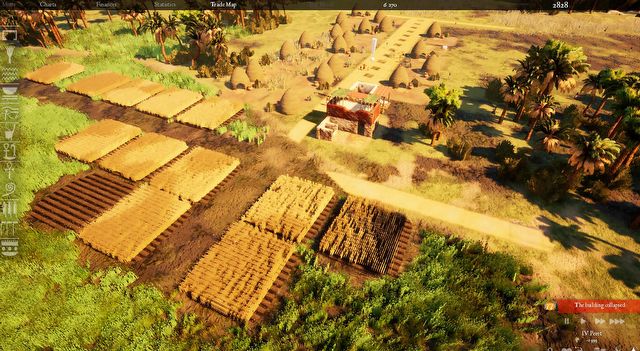
Medic: Jak wyglądają techniczne aspekty produkcji?
Jacek Turek: Gra powstaje na silniku Unreal Engine 4 - jest to potężne narzędzie i zarazem niesamowicie elastyczne, pozwala zasadniczo na absolutnie wszystko. Ma bardzo bogatą dokumentację oraz ogrom assetów do kupienia, fragmentów kodu, gotowych templatów – niestety praktycznie nic, co by było związane z city builderami i Starożytnym Egiptem, stąd też niemal wszystko, co gracz zobaczy w grze będzie przez nas osobiście stworzone, począwszy od kodu gry po grafikę na muzyce kończąc.
Medic: Cezar, Faraon czy Zeus osiągnęły ogromny sukces i zyskały status produkcji kultowych. Działo się to jednak w zupełnie innych czasach, w kompletnie różnych uwarunkowaniach rynku gier. Czy myślisz, że współcześnie, gdy w sektorze gier ekonomicznych spotyka się głównie arcadowe produkcje z uproszczoną mechaniką lub wręcz odwrotnie - wielkie, skomplikowane sandoboxy, jest miejsce dla klasycznego city-buildera z liniową kampanią dla pojedynczego gracza?
Jacek Turek: Myślę, że tak. Gry single player mają się bardzo dobrze, co pokazał nasz rodzimy Wiedźmin. Aktualnie niestety ze świecą szukać prawdziwego city buildera, który by wciągnął na więcej niż 5 minut i nie był którąś z kolei kopią Banished. Poważni wydawcy już dawno porzucili ten gatunek gier na rzecz zupełnie innych. Ostatnie większe produkcje zawodziły albo upraszczały tak bardzo mechanikę, że tym samym zabijały istotę samej rozgrywki. Sądzę, że jest tutaj ogromna nisza, co zdecydowanie ułatwi nam wejście na rynek, szczególnie że faktycznie powstaje już kilka gier z którymi wspólnie możemy na nowo próbować rozkręcić ten segment.
Medic: Czy HAL ujrzy światło dzienne przed końcem roku? Jakie będzie miał wymagania systemowe?
Jacek Turek: Staramy się jak możemy, ale niestety to się nie uda z wielu różnych powodów. Zdajemy sobie sprawę z tego, że mechanika gry wymaga bardzo długiego testowania i nie może być w żaden sposób potraktowana po macoszemu. Liczymy tu na grono graczy, które będzie miało ochotę z nami na ten temat dyskutować i tym samym wprowadzać zmiany naszymi rękoma. Dlatego też wersja finalna powstanie wtedy, gdy wszystko będzie gotowe. Z tego powodu nie możemy podać też ostatecznych wymagać sprzętowych.
Medic: HAL to prawie wyłącznie twoje dzieło - pracujesz w pojedynkę. Kiedy rozpocząłeś tworzenie gry? Ile czasu zajmują prace i jakie są największe trudności stojące przed niezależnymi twórcami gier?
Jacek Turek: Hard Ancient Life to w zasadzie dzieło jednej osoby. Wszystko zaczęło się na początku 2016 roku, kiedy bardzo intensywnie pracowałem nad prototypem, by móc odpowiedzieć sobie na pytanie, czy Unreal Engine w ogóle nada się do tego typu zadania i czy ja jestem w stanie taką grę stworzyć. To wymagało bardzo dużego poświęcenia i zaangażowania się w opracowywanie konceptu. Postanowiłem, że na tym etapie będzie to moja mała tajemnica, więc nie mogłem się z nikim skonsultować. Jako, że wszystko do gry robię sam to naturalnie po skończeniu prototypu i przekonaniu się, że powstanie HAL jest możliwe, zacząłem pracować nad aspektem wizualnym. Powstały pierwsze budynki, elementy środowiska, postacie i dwie pierwsze mapy. To był krytyczny moment w całym procesie produkcji, ponieważ od tego zależało jakie będzie pierwsze wrażenie po umieszczeniu informacji o grze w sieci.
Jakież było moje zaskoczenie, kiedy postanowiłem najpierw napisać o tym na wykop.pl, gdzie gra „wjechała w gorące”. Efektem była kompletnie nieprzespana noc, absolutnie niesamowita chwila, kiedy dostałem jasne, klarowne zapewnienie, że cała praca miała i ma sens. Od tamtej pory nie miałem już praktycznie żadnej przerwy w produkcji a grą zainteresowało się kilku wydawców, głównie zagranicznych.
Do zespołu również dołączył bardzo utalentowany kompozytor, Paweł Płoskoń, który będzie odpowiedzialny za oprawę muzyczną. Dlatego też w pozostałych odpowiedziach użyłem liczby mnogiej.
Prace nad grą zajmują mi praktycznie cały wolny czas jaki posiadam po swojej podstawowej pracy. Ponadto wszelkie zakupy finansowane są z moich prywatnych pieniędzy. Wydaje mi się, że to jest właśnie największa trudność stojąca przed niezależnymi twórcami gier – brak środków finansowych. W pewnym momencie pojawia się duża pokusa, żeby grę doprowadzić do jakiegokolwiek stanu umożliwiającego wydanie i wypuszczenie w formule „early access” - ulega jej wielu małych deweloperów, co niestety, według mnie, rozmiękcza zainteresowanie grą i potencjalną sprzedaż. Bardzo zależy nam na tym, żeby wersja wczesnego dostępu HAL, którą zamierzamy wydać w I kwartale 2019 roku, była naprawdę warta zagrania.
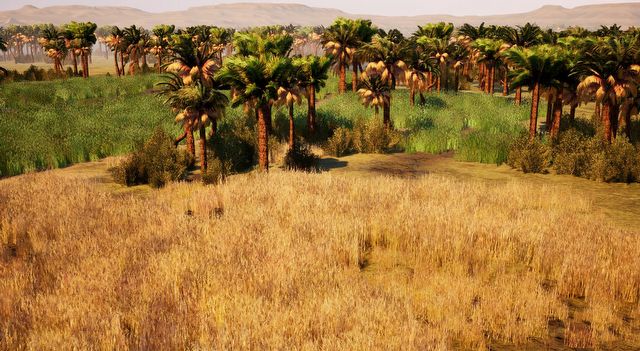
Medic: Jakie masz plany po wydaniu HAL? Będziesz rozwijał produkcję i wydawał rozszerzenia, czy może zajmiesz się nową produkcją, inspirowaną którąś innych z klasycznych strategii?
Jacek Turek: Po ostatecznym wydaniu Hard Ancient Life ruszy produkcja drugiej kampanii, o której wspomniałem wyżej. A co będzie dalej? Cóż, zobaczymy gdzie zaniesie nas pierwsza gra - czy się spodoba graczom i czy byłby sens kontynuować tę przygodę w takim formacie z kolejnym bardzo ciekawym starożytnym państwem, które w grach ostatnio praktycznie już się nie pojawia.
Ewentualnie wprowadzimy tryb battle royale ;)
------------------------------------------------------------------------------------------------------
Hard Ancient Life – the polish teleport to ancient times

Among thousands of independent projects in development, there are many interesting productions that would never have the chance to be founded if their fate relied solely upon big companies of the computer game market. These titles must be driven by passion and devotion of their creators, who very often work at home without any support from professional developers’ studios. A good example of such game is a one-man creation – Hard Ancient Life. It’s a city builder inspired by famous strategies in productions from Sierra Company’s good old days, especially Pharaoh and its addon – Cleopatra. We had a chance for a small chat with its author Jacek Turek.
Before we start, let’s explain what kind of game Hard Ancient Life is going to be. According to what we know, for now HAL is going to be a totally old-school strategy game, giving us a chance to rule ancient Egyptian cities in the times from Old Kingdom till the dawn of Egypt independence in the Roman period. The core of the game is a long single-player campaign, settled in ancient Egypt. Apart from the main part of the mechanics, which is of course planning and constructing the city, we are going to take care of citizens’ needs, exploit resources, trade, and command our army.
Medic: Hard Ancient Life is the same game as Pharaoh, but with new, modern graphics. True or false?
Jacek Turek: False. The game is inspired by Pharaoh indeed, but the similarities end in the basics of the game. Indeed, building construction will look familiar to Pharaoh’s fans as well as the monuments, which are complex structures built in several steps, and the city can be also invaded from time to time. However, that’s basically all because other aspects of the game work in a different way. What is more, all buildings were designed according to historical reconstructions or real models buried with the dead. We have done our best especially to make the monuments look the way they did in the ancient past – we have not compromised on them for a better fit in the gameplay or cut corners by using generic assets. The realism is one the most important features of the game.
This leads as to another very important issue - what about the Egyptian religion? In Hard Ancient Life we introduce it as a one of the society’s element, not as an independent system. It means that there is not going to be any physical presence of the gods, who demolish the city in revenge for the lack of attention from their worshippers. It is the people themselves that will demand a proper religious service and the way we respond to their demands will be a factor that influences the whole gameplay. We hope that this complex model of the society will let you feel and observe the reality of people’s life.

The next thing, maybe even the most important, is the whole economic system. We are still developing it, adding new great features, and modifying existing aspects. I think that polishing this part will take more time than other game elements. The player will face micro as well as macro-management challenges such as problems with tax collection or the influence of the economy on the everyday life of particular social classes. It was pretty common in ancient Egypt that a peasant was forced to flee from home, even leaving his family behind, when he was not able to pay his duties – everything because of very harsh and brutal tax collectors. The player will have to decide then how he or she will treat their subjects, which of course will influence the overall efficiency of the economy of the city.
Trade is also coming to HAL. As compared to Pharaoh, it has been broadened by random factors influencing trade rates and supply of goods. The player will have to trade in order to accomplish missions or satisfy demands of the Pharaoh (and thus prevent his troops from invading the city). We will be able to produce all goods available in the game (the number of which is even bigger than in Pharaoh) in the course of the main campaign. Of course, every mission will offer a different set of goods and production chains. The process of crafting will be transparent and easy to monitor – the player will see how particular items are being made – no matter if it is just a simple brick or such a complex object like a chariot.
As a “brand new” element in the game, we are introducing expeditions to distant lands for gathering rare resources. They will be very expensive. An excursion will pay off hugely if it succeeds, but if it fails it may become a source of great troubles and lower the gamer’s popularity rate or end up with an invasion from a foreign city.

Medic: There is no doubt that the extended campaign, telling the story of ancient Egypt from the predinastic era to the Ptolemaic times, was a great advantage of the original Pharaoh and its addon - Cleopathra. Will HAL also take the player for such journey through the history of Egypt?
Jacek Turek: The main campagin starts at the moment of the unification of Lower and Upper Egypt and ends with the fall of the Ptolemaic dynasty. The most important part of the Ancient Egypt’s history is set between these two moments. The game presents this story in a number of consecutive missions -both peaceful, focused on the economy - and military, in unsettled lands.
We also want to introduce a second campaign, which will show up after the game’s release. It will bring closer everything that we already know about what was happening before the Unification in the Predinastic era. The player will follow the first Egyptian settlers, find out where they came from, what the path to the unification was and how the Egypt’s amazingly complex religion was born. This will be something that no other game has ever explored in such detailed way.
Medic: Pharaoh, as well as other strategy games from Sierra, had perfect mechanics of building and managing cities, logistics, economy, trade, and monument construction. However, commanding armies in these titles was very clunky. Will HAL change anything in that matter?
Jacek Turek: Pharaoh was a wonderful game, but military aspects were indeed very frustrating for me. I felt that they were not only boring but also implemented without a good plan. In HAL the battles will be definitely more epic, but not as common as in Pharaoh. I can’t give you any more details because military module is still in development, suffice to say we are trying to make some kind of a substitute of Total War mechanics, of course limited to our humble needs.
Medic: I guess that mechanics is going to be a source of HAL strength, but does the game have any highlights – something that will make our jaws drop?
Jacek Turek: When you play Pharaoh, nothing really happens for a long part of the game. The player designs a city and waits until it develops. The city construction process itself is a purely mechanic thing – it must be quick, intuitive and honestly, there is nothing more to upgrade here. But we want to make this long moment – I mean, the moment when everything is prepared and the gamer has nothing more to do but watching citizens make use of it - something amazing. We hope that players will love the game for how dynamic and full of life the society is and for the environment of the cities. Watching people live, work, and rest, as well as observing the course of social changes will be a very special experience.

Medic: What are the technical aspects of the production?
Jacek Turek: We use Unreal Engine 4 because it is a really powerful and flexible tool, giving us a chance to make almost everything we want. It has a good support and a rich library of assets, code pieces, and ready-to-use templates, but unfortunately only a few items fit to the city builder and Ancient Egypt themes. This is why we created everything that the player will enjoy in HAL – game’s code graphics or brand new music – from scratch.
Medic: Caesar, Pharaoh or Zeus became very successful and reached almost the “legendary” status, but it happened long time ago, when the game’s market was totally different. Today, in terms of economic games, vast majority of the projects in development are on the one hand arcade and simplified titles, and on the other, massive, complex sandboxes. Do you think that there still is room for a classic city-builder with linear, single-player campaign?
Jacek Turek: I think so. Single-player games are getting on fine in the market, and The Witcher 3 is just one of many examples. Unfortunately, city builders is a different story – it’s hard to find such game that would keep your attention for more than 5 minutes while not being another copy of Banished. Big developers are not very eager to work on this genre. Most of the recent productions turned out to be disappointing or extremely simplified, which kills the sense of gameplay. Here we have a kind of a niche, and this will probably help us with our release. There is a couple of similar games in development, maybe this synergy will revive the city-builders segment.
Medic: Will HAL be released before the end of 2018? Can you estimate system requirements?
Jacek Turek: I’m afraid that this is not possible for numerous reasons. We are aware that the game mechanics must be thoroughly tested and we cannot cut any corners here. We count on the community which has already gathered around HAL – we hope that the players will share their impression with us and help us to improve the game. The final version will be released when everything is finished and polished, so we cannot set any release date and system requirements for now.
Medic: HAL is mainly your own creation – you are working on it as a one-man studio. When did you start? How much time does it take? What are the biggest problems that independent game makers have to face?
Jacek Turek: Everything started at the beginning of 2016, when I prepared a prototype which helped me to answer if I am able to manage such a complex task and if Unreal is a proper engine for this kind of game. Making the general concept of HAL required devotion and maximal engagement from me. At this stage, I promised myself to keep my plans secret, hence I did not consult it with anyone. As I made sure that this idea can become true I started working on the graphic aspect. I designed the first building, the elements of the environment, and two maps. This was a really critical moment, because I knew that after showing this very first pieces of HAL in the web, the feedback would decide about the game’s future.
How surprised I was when on wykop.pl the game became “hot”. During this amazing, sleepless night I got a clear message that my work and whole idea of the game made sense. Since then, I have been working on HAL without any longer break and several publishers, mostly foreign, became interested on the game.
After some time Paweł Płoskoń joined the team (that’s why I am using “we” in this interview). He is a very talented composer, responsible for music in HAL.
The game takes almost every free moment I have after my regular job. I also have to pay for every necessary purchase for the game myself. I think that this is the most important difficulty for independent game makers – lack of money. At some stage, it becomes very tempting to prepare any playable release of the game and send it to “early access”. In my opinion this is not the best way as it dilutes the “hype” over the game in development and hence lowers financial results of the final version. We want to make HAL “early access” version, which is expected in Q1 2019, valuable and worth playing.

Medic: What are your plans after the release of HAL? Will you continue developing the game and make expansions or head for a totally new project, inspired by another classic strategy game?
Jacek Turek: When Hard Ancient Life is released, we will start working on the second campaign, which I mentioned before. After that, we will see if HAL succeeds and how the overall players impression is. This will give us a hint if it makes sense to continue this adventure in another very interesting ancient land, which does not show up in recent games.
After all, we can always introduce a battle royale mode ;)
więcej na temat
- Recenzja Dungeons 3 – Złowrogie Zło wciąż w formie
- Co się stało z grami typu Tycoon?
- Recenzja Game Dev Tycoon – od zera do Gabe’a Newella
- Citybound – własne, być może lepsze, wyobrażenie Sim City.
- Daj tej grze szansę... i poświęć na nią cały wieczór
- Powrót do przeszłości: Cezar III
- Transport Tycoon Deluxe – recenzja (PC)
- UV ocenia grę Theme Hospital - RETROKVLT!
- Rojopojntofwiu #9 Strategicznie i ekonomicznie
- „Zbudujemy nowy dom, jeszcze jeden nowy dom…”
